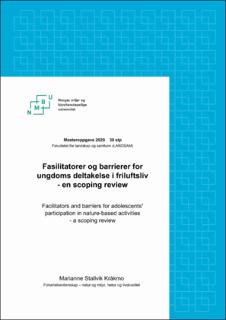Fasilitatorer og barrierer for ungdoms deltakelse i friluftsliv : en scoping review
Master thesis
Permanent lenke
https://hdl.handle.net/11250/2726423Utgivelsesdato
2020Metadata
Vis full innførselSamlinger
- Master’s theses (LandSam) [1033]
Sammendrag
Bakgrunn: Gjennom tenårene er trenden at ungdom faller fra organiserte fritidsaktiviteter, og er i mindre kontakt med naturomgivelser. Samtidig øker forekomsten av psykiske plager og lidelser hos ungdom. Det er vist at deltakelse i friluftsliv har sammenheng med ungdoms fysiske aktivitetsnivå samt mentale utvikling, og opphold i naturlige omgivelser kan gi restorative opplevelser som forebygger psykiske plager. Naturopplevelser trenger ikke å koste mye og nærfriluftsliv kan gi de umotiverte og lite aktive et lavterskeltilbud, noe som er i tråd med prinsippene for det systematiske folkehelsearbeidet. For å kunne tilrettelegge for ungdoms deltakelse i friluftsliv på en bedre måte er det derfor nødvendig å få mer innsikt i deres egne opplevelse av hva som fasiliteter og hindrer slik deltakelse.
Hensikt: Hensikten med forskningsprosjektet er å gi en mer samlet forståelse av hvorfor ungdom mellom 10-20 år deltar eller ikke deltar i friluftsliv, fra deres eget perspektiv. Problemstillingen er: «Hva vet vi fra eksisterende litteratur om ungdoms selvrapporterte fasilitatorer og barrierer for å delta i friluftsliv?». Målet er å få økt innsikt i ungdoms egne opplevelser slik at effektive tiltak for å øke deres deltakelse i friluftsliv kan iverksettes.
Metode: Scoping review ble benyttet som metode for å kartlegge kompleksiteten ved eksisterende kunnskap som finnes om friluftsliv hos ungdom og syntetisere dette, i tillegg til å kunne identifisere kunnskapshull om temaet. Det ble gjennomført litteratursøk i tre databaser som resulterte i totalt 3083 treff, hvor 24 unike studier til slutt ble inkludert. Funnene ble syntetisert ved hjelp av narrativ og datastyrt teknikk, og dataene ble systematisert etter en sosioøkologisk tilnærming som resulterte i en determinantmodell for deltakelse i friluftsliv.
Hovedfunn: Forskningsprosjektet har gitt økt innsikt i ungdoms selvrapporterte fasilitatorer og barrierer for deltakelse i friluftsliv, samtidig som noen kunnskapshull er identifisert. Hovedtyngden av funn dreier seg om ustrukturerte aktiviteter i nærfriluftslivet. Funnene viser at ungdoms deltakelse i friluftsliv påvirkes av individuelle faktorer som for eksempel alder, kjønn, opplevd trygghet samt personlige opplevelser og behov, som er knyttet til sosiale omgivelser som for eksempel venner, sosial støtte, foreldrerestriksjoner og menneskelige trusler. Videre påvirkes dette av nærhet og tilgjengelighet av egnede og godt vedlikeholdte friluftslivsfasiliteter i de bygde omgivelsene. I tillegg spiller naturlige omgivelser som for eksempel værforhold inn på hvorfor ungdom deltar eller ikke deltar i friluftsliv. Det trengs mer forskning på temaet for skandinaviske forhold, deltakelse i friluftsliv langt fra hjemmet og på hvordan kulturelle faktorer henger sammen med problemstillingen. Background: Individuals tend to drop out from organized leisure activities during adolescence, and in general adolescents spend less time in natural environments. At the same time, the prevalence of psychological complaints and mental health disorders is increasing in the adolescent population. Research has shown that participation in nature-based activities is related to adolescents’ level of physical activity as well as mental development, and the presence of natural surroundings can provide restorative experiences that prevent psychological complaints. Nature experiences do not have to be expensive and nature-based activities close to home can give the unmotivated and inactive adolescents a low-threshold offer, which is in line with the principles of systematic public health work. To be able to facilitate participation in nature-based activities throughout adolescence in a better way, it is therefore necessary to gain more insight into adoleVcenWV’ own experience and perceptions of what promotes and hinder such participation.
Purpose: The purpose of this research project is to provide a more comprehensive and synthesized understanding of why adolescents between the ages of 10-20 years participate or do not participate in nature-based activities, from their own perspective. The research question is: What do we know from the existing literature about adolescents’ self-reported facilitators and barriers to participate in nature-based activities? The aim is to gain increased insight into adolescents’ own experiences so that effective actions can be implemented to increase their participation in nature-based activities.
Method: A scoping review was conducted both to map and synthesize the complexity of existing knowledge about nature-based activities and adolescents, and to identify knowledge gaps on the topic. Literature searches were carried out in three databases. This resulted in a total of 3083 search results, of which 24 unique studies were eventually included. The data were synthesized using narrative and editing analysis style, and the findings were systematized according to a socio-ecological approach which resulted in a determinant model for participation in nature-based activities.
Main findings: The research project has provided increased insight into adolescents’ self-reported facilitators and barriers for participation in nature-based activities, and some knowledge gaps have been identified. The majority of findings concerns unstructured nature-based activities close to home. The findings show that adolescents’ participation in nature-based activities is influenced by individual factors such as age, gender, perceived safety and personal experiences and needs, which are linked to social environments such as friends, social support, parental restrictions and human threats. Furthermore, this participation in nature-based activities is influenced by proximity and accessibility to applicable and well-maintained nature-based facilities in the built environment. Additionally, aspects related to the natural environments, such as weather conditions, seem to play a role for why adolescents participate or do not participate in nature-based activities. More research is needed on the topic for Scandinavian conditions, participation in nature-based activities far from home and on how cultural factors are related to the issue.

